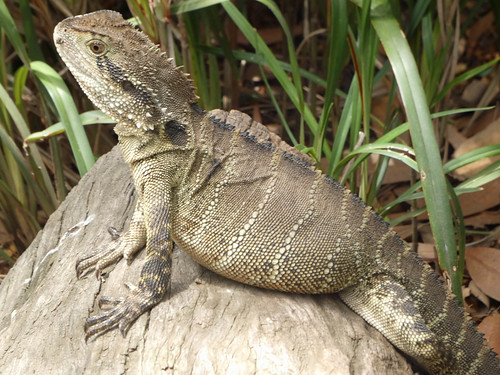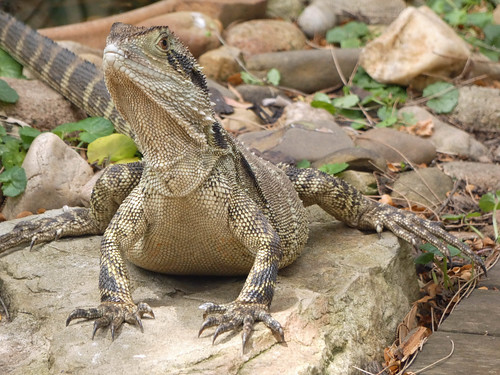Bearded dragons are one of the most popular pet reptiles due to their friendly and gentle personalities. However, even with proper care, bearded dragons can develop health issues.
Knowing the common health issues and how to treat them at home can help keep your bearded dragon healthy and happy. Surprisingly, some of the most common health issues that bearded dragons can experience are similar to those of humans, such as respiratory infections and skin infections.
In this article, we will discuss five common health issues that bearded dragons can experience, as well as home treatments for each.
Importance of Understanding Common Health Issues and Home Treatment
As with any pet, it is essential to understand common health issues that may affect bearded dragons as early detection can help prevent worsening conditions that may result in death.
Some common health issues that bearded dragons commonly experience include metabolic bone disease (MBD), parasite infestation respiratory infections impaction, and shedding problems.
Home treatment can help alleviate mild symptoms or even cure some diseases if detected early on; thus saving you money on veterinary bills. However, it is important to note that not all conditions can be treated at home and may require professional assistance from a veterinarian knowledgeable in treating reptiles.
In this article, we will discuss five common health issues affecting bearded dragons and their respective home treatment options. It is crucial to understand the causes of each condition as well as prevention measures so you can provide your pet with the best possible care they deserve to ensure they live a long and healthy life.
Common Health Issues
Metabolic Bone Disease (MBD)
Metabolic Bone Disease (MBD) is one of the most common health problems in bearded dragons. The main cause of MBD is a lack of calcium and vitamin D3 in their diet or poor lighting conditions.
Symptoms of MBD include swollen jaws, bowed legs, difficulty moving, and lethargy. If left untreated, MBD can lead to permanent deformities or even death.
Prevention measures for MBD include providing a balanced and nutritious diet that includes calcium supplements and vitamin D3 supplements or proper UVB lighting to help them absorb calcium more efficiently. Ensuring proper humidity levels in their enclosure can also aid in preventing metabolic bone disease.
Home treatment options for MBD include increasing dietary supplements, UVB lighting or exposing the dragon to natural sunlight for at least 30 minutes a day, and providing bone meal or cuttlefish bones as an additional source of calcium. Severely affected bearded dragons may require veterinary attention.
Parasites
Parasites are another common health issue found in bearded dragons with gastrointestinal parasites being the most prevalent type. They can contract these parasites from eating live prey, contaminated produce, or from unsanitary living conditions.
Symptoms of parasitic infection include weight loss, diarrhea or constipation, vomiting, and lethargy. A veterinarian can diagnose parasitic infections through fecal testing.
Treatment options for parasites depend on the severity of the infection but often involve medication prescribed by a veterinarian. Home treatment options for parasites may involve giving natural remedies such as pumpkin seeds and garlic that are known to help eliminate certain types of parasites from their digestive tract.
Respiratory Infections
Respiratory infections occur when bacteria enter the lungs through the nose and mouth due to unclean living conditions or improper temperatures. Symptoms of respiratory infection include wheezing, lethargy, and discharge from the nose or mouth.
Prevention measures for respiratory infections include keeping the bearded dragon’s enclosure clean and well-ventilated while maintaining proper temperature and humidity levels.
Home treatment options for respiratory infections may include providing a warm, humid environment through steam therapy or a nebulizer. Antibiotics may also be prescribed by a veterinarian for severe cases.
Impaction
Impaction occurs when undigested food or foreign objects blocks the digestive tract. Symptoms of impaction include lethargy, swollen stomach, loss of appetite, and constipation.
Prevention measures for impaction involve providing your bearded dragon with a diet that includes foods high in fiber such as leafy greens and avoiding substrate that can cause blockages such as sand or gravel.
Home treatment options for impaction may involve warm baths to help stimulate bowel movements. In severe cases, surgery may be required to remove the blockage.
Shedding Problems
Shedding problems can occur when there is not enough moisture in the air or due to poor nutrition. Symptoms of shedding problems include incomplete shedding or dry patches on their skin.
Prevention measures for shedding problems involve ensuring proper humidity levels in their enclosure and providing a nutritious diet that includes appropriate vitamins and minerals essential for healthy skin regeneration.
Home treatment options for shedding problems include increasing humidity levels through misting or providing a humid hide, which is an enclosed area that retains moisture. Additionally, giving them lukewarm baths can help loosen any remaining shed skin.
Home Treatment for Common Health Issues in Bearded Dragons
As a responsible pet owner, detecting common health issues in your bearded dragon and providing appropriate treatment is crucial. This section will discuss some home treatment options for various health issues that bearded dragons commonly experience.
Nutritional Supplements for MBD Treatment
Metabolic Bone Disease (MBD) is a common health issue that occurs when bearded dragons do not receive enough calcium or vitamin D3. Some signs of MBD include lethargy, difficulty walking, tremors, and bone fractures. To treat MBD at home, you can provide your bearded dragon with nutritional supplements.
Calcium supplements are essential to counteract the lack of calcium intake in their diet. You can give them calcium powders mixed with food or dust their food with it once or twice per week.
Vitamin D3 supplements are also necessary to ensure that the body absorbs the calcium properly. Vitamin D3 supplements can come in liquid forms and added to water bowls.
Natural Remedies for Parasite Treatment
Parasites are another common issue that affects bearded dragons. Symptoms include diarrhea, weight loss, and lethargy.
If you suspect your pet has parasites, there are natural remedies you can use as an alternative to prescription medicines. One natural remedy is feeding your bearded dragon small amounts of pumpkin seed as it acts as a natural dewormer and aids digestion too.
Another way is by giving them a mixture of garlic juice diluted with water two times per day to repel parasites due to their antibacterial properties. However, it’s essential to consult a veterinarian before trying any treatments on your own as even natural remedies may have side effects on certain individuals’ pets.
Steam Therapy for Respiratory Infection Treatment
Respiratory infections are common among reptiles due to their inability to regulate their body temperature. Symptoms include difficulty breathing, coughing, and nasal discharge. At home, you can use steam therapy to help relieve respiratory infections.
Firstly, place your bearded dragon in a box with clean towels at the bottom with a humidifier running to increase humidity levels, which will aid breathing. You can also add essential oils like eucalyptus oil or tea tree oil to the humidifier for a soothing effect.
Warm Baths for Impaction Treatment
Impaction occurs when bearded dragons consume indigestible materials like sand or rocks that get stuck in their digestive system. Symptoms include lethargy and bloating.
Warm baths are an effective home treatment for impaction. Fill a shallow water dish with warm (but not hot) water and place your bearded dragon in it for 10-15 minutes as it helps them relax and stimulate bowel movements.
Humidity Control for Shedding Problems
Bearded dragons shed their skin frequently, but sometimes shedding problems may occur due to low humidity levels that result in incomplete shedding or retention of old skin layers. Humidity control is essential for shedding problems.
You can increase humidity levels by adding a misting system or keeping damp towels near the terrarium’s basking spot. Also, ensure they have access to water bowls regularly as they help maintain hydration levels which lead to proper shedding.
If shedding problems persist, consult your veterinarian for further guidance. These various home treatments are often effective at treating common health issues in bearded dragons; however, it’s essential to seek veterinary advice if symptoms persist as some illnesses may require more advanced medical care than what we can provide at home.
Conclusion
Bearded dragons make wonderful pets that can be kept healthy and happy with proper care. As with any pet, it’s important to understand their unique health needs and recognize the signs of common health issues. By doing so, you can take action early on to prevent serious complications and provide home treatment when necessary.
Summary of the Common Health Issues in Bearded Dragons Discussed
Throughout this article, we’ve discussed the five most common health issues in bearded dragons: metabolic bone disease, parasites, respiratory infections, impaction, and shedding problems.
For each issue, we’ve covered the causes and symptoms as well as prevention measures and home treatment options. Metabolic bone disease results from a lack of calcium or vitamin D3 in a bearded dragon’s diet.
Parasites are often spread through contaminated food or water sources. Respiratory infections can occur due to poor husbandry practices or exposure to other sick reptiles.
Impaction can result from ingestion of foreign objects or constipation caused by inappropriate diets. Shedding problems may arise due to improper humidity levels in the enclosure.
The Importance of Early Detection, Prevention, and Home Treatment
Early detection is crucial when it comes to treating common health issues in bearded dragons. By recognizing symptoms such as lethargy, loss of appetite, or abnormal behavior early on, you can seek veterinary care or provide appropriate home treatment before these issues progress into more serious conditions.
Prevention measures such as proper nutrition and hygiene practices go a long way toward keeping your bearded dragon healthy.
Additionally providing a clean environment with appropriate temperatures and humidity levels will keep respiratory infections at bay while preventing impaction from developing. When it comes to home treatment for your pet’s health issues there are many options available that do not require veterinary intervention if caught early enough.
Natural remedies for parasites such as garlic baths or steam therapy for respiratory infections are just a few examples. Providing nutritional support for MBD is another way to treat a common health issue at home.
Final Thoughts on the Significance of Responsible Pet Ownership
Responsible pet ownership is key to keeping your bearded dragon healthy and happy. By educating yourself on their unique health needs and providing proper care, you can avoid many of the common health issues outlined in this article.
Remember that early detection, prevention, and home treatment are all important steps in ensuring the best possible outcome for your pet’s health issues. With the right care, your bearded dragon can live a long and healthy life as a beloved member of your family.


